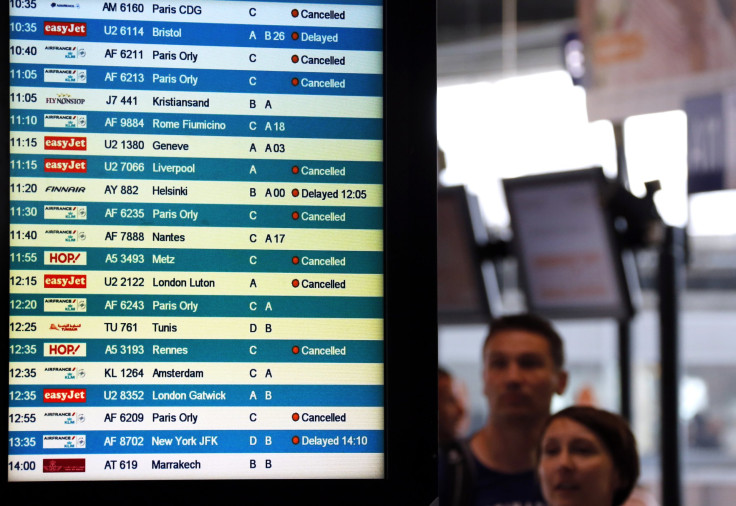French Airport Strikes Could Expand To 10 EU Nations Wednesday

A plan to bring the European Union under a “Single European Sky” prompted widespread strikes that began in France Tuesday, but will expand in varying degrees to 10 other nations across the continent Wednesday.
Workers who walked off the job Tuesday did so to protest the EU proposal to centralize control of the continent’s airspace, a move designed to reduce duplication of work in the bloc’s 28 nations. The unions fear that if the plan comes to fruition, air traffic controllers will lose jobs or their wages will be slashed. France’s air traffic controller union, SNCTA, backed by the European Transport Workers’ Federation, or ETF, called for expanded walkouts across Europe on Wednesday, but canceled a planned third day of strikes on Thursday, citing opposition from the French and German governments to the EU proposal.
French Transport Minister Frederic Cuvillier announced Monday that he and his German counterpart had delivered a memorandum to the European transport commissioner asking the European executive to freeze the project. The national authorities, both ministers said, needed more time to adapt to the plan.
The Brussels-based European Commission, however, pushed ahead Tuesday, saying inefficiencies in Europe’s fragmented airspace bring extra costs of close to 5 billion euros each year to airlines and their customers and add 42 kilometers to the distance of an average flight, “forcing aircraft to burn more fuel, generate more emissions, pay more in costly user charges and suffer greater delays.” It said air traffic charges were nearly double those in the similarly sized U.S. airspace.
“Our airlines and their passengers have had to endure more than 10 years of reduced services and missed deadlines on the route to a Single European Sky. We cannot afford to continue this way,” EU Transport Commissioner Siim Kallas said Tuesday. “Today we are strengthening the nuts and bolts of the system so it can withstand more pressure and deliver ambitious reforms even in difficult economic times.”
Member states and European Parliament must approve the commission’s proposal before it becomes a law in a process that could take a year or more. Air France-KLM, the continent’s biggest carrier, and Ryanair, its largest low-cost operator, have both called for a speedy end to Europe’s hodgepodge air traffic control systems.
“It is unacceptable that the skies over Europe are repeatedly closed or flights are delayed by the unjustified strike action of tiny numbers of air traffic controllers,” Robin Kiely, head of communications at Ryanair, said Monday. “These public servants are among the most overpaid and protected in Europe and yet they repeatedly opt for the strike weapon as a first, rather than a last resort.”
The International Air Transport Association also lashed out against the strikes, while welcoming the European Commission’s proposal. Tony Tyler, IATA’s director general and CEO, said air travelers “should not be held hostage by ETF resistance to critical change.”
“The fears of the ETF, which represents only a portion of European air traffic control officers, are completely misguided,” he stated Tuesday. “The commission shares the industry’s frustration with the failure of European states to progress the SES [Single European Sky]. Every year that SES languishes in limbo is a 5 billion euro knock to European competitiveness and costs the environment 8.1 million tons of wasted carbon emissions.”
Cancellations And Delays
Some 1,800 flights in and out of France were canceled Tuesday due to the strikes, accounting for about a fourth of all scheduled trips. Included in the Civil Aviation Authority’s contingency plan was a request that all airlines serving Charles de Gaulle, Orly, Bordeaux, Beauvais, Lyon, Nice, Marseille and Toulouse airports trim their schedules to about half the normal flights. Consequently, airlines like Lufthansa, Air France, Easyjet and Ryanair nixed most short- and medium-haul flights, but maintained their more lucrative long-haul schedules.
Air France said last-minute delays and cancellations were to be expected Wednesday, but promised to maintain all long-haul flights to and from Paris. “As the strike action has been lifted, Air France expects to return to normal flight operations during the morning of Thursday 13 June,” the carrier said on its website Tuesday evening.
Delays and cancellations Wednesday could grow even larger, according to the ETF. The organization said late Tuesday that air traffic controllers in Hungary would join French workers in a work stoppage, while controllers in Belgium, Italy, Portugal, Slovakia and the Czech Republic would work to rule, performing only the tasks that fall within their remit during contractual hours. Controllers in Austria, Bulgaria, Latvia and the UK may also take similar actions, the organization said.
Ryanair noted that it had pre-emptively canceled 130 flights for Wednesday, while Lufthansa axed more than 170 and Easyjet nixed 128. Air France, meanwhile, had not yet released the number of flights it would scrap from its schedule Tuesday evening.
All travelers flying through European airspace are encouraged to check for updates directly through airlines’ websites and social media. Under European Union regulations, all passengers are entitled to either a full refund of the unused portion of a canceled flight or a chance to be re-routed to a destination as soon as possible, though many airlines also offer rebooking at a later date at no additional cost. Regulations also state that, when a flight on an EU airline or from an EU airport is canceled, the airline is liable to pay for the cost of a hotel and subsistence, within reason.
Follow me on Twitter @MarkJohansonIBT
© Copyright IBTimes 2024. All rights reserved.






















